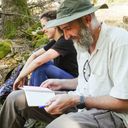Jul 8, 2020
Announcing a brand new way to quantify our contribution to carbon capture
EcoTree is the world’s first sustainable forestry company to earn Bureau Veritas verification for its carbon capture calculation. Here’s why this is a big deal.

We are delighted to announce that our methodology for calculating carbon capture and storage (sequestration) in our forests has been verified by the highly esteemed Bureau Veritas, one of the world’s largest certification organisations for environmental standards. EcoTree is one of the first sustainable forestry companies in the world to receive this verification. This is not only a great honour, but also means we can now use our verified expertise to help other forestry organisations quantify their contribution to the fight against climate change. Because we’re all in this together.
Why do we need our carbon capture calculations verified?
We are foresters first and foremost, which means that taking care of the trees, wildlife and the ecosystems of our forests in general is our absolute priority. But at the same time, we’re starting a movement that’s rewarding environmental actions economically as well as intrinsically.
So being about to tell our tree owners how much of an impact they are making in the fight against climate change is as important as being able to tell them how much value their tree has gained and how much money they can expect to receive when their tree is eventually cut for sustainable timber.
And we’re not into guessing. Though carbon capture calculations of a forest area are hypothetical, it is imperative that our figures can be held up to the highest possible standards for predicting ecological impact. That’s why this news is so exciting for us. And for the planet!
What does verification by Bureau Veritas mean?
Bureau Veritas verification means that our unique approach to sustainable timber production, which prioritises the preservation of biodiversity along with the capture of carbon, now officially demonstrates a valuable contribution to the fight against climate change. And it shows that vibrant plant and animal life within a forestry ecosystem does not diminish the contribution a forest makes to the carbon sink. It just makes it better all round!
It is our hope that having a simple and easy-to-interpret calculation for our tree owners will make it easier for them to spread the message too, about how much of a difference companies and individuals can make to the planet by investing in EcoTree. Because we are growing and our forests are growing too. We’re putting forestry in everyone’s hands. Now we’re putting numbers in the hands of our tree owners, so they can more easily see the good their investment is doing over the lifetime of their trees.
How do our newly verified carbon capture calculations work?
Our quantification methodology for capturing carbon was inspired by an innovative new carbon label announced in France last year, the Low Carbon Label. The aim of this label is to boost investment and trust in forestry and agricultural projects that prioritise the capture and storage of carbon. This will hopefully plant the seeds of a more sustainable sector.
Unlike the Low Carbon Label however, EcoTree’s new method doesn’t limit the quantification of carbon capture to 30 years. Instead we take into account the carbon sequestered throughout the varied lifetime of the trees we manage for our individual tree owners.
We achieved this by working with independent forestry experts on sustainable forestry plans and planned interventions in particular areas of our forests. We used parameters such as tree species, soil fertility and forestry management objectives (for example natural regeneration versus irregular forest) to predict the most probable outcomes for individual trees and plots in terms of carbon capture potential.
"EcoTree’s carbon methodology, developed with forest experts and engineers and verified by Bureau Veritas, allows us to establish the seriousness of the EcoTree model and to draw on the multitude of services provided by the forest when it is managed sustainably, every day, by our teams of experts in the field.”
Erwan Le Méné, Ecotree Co-founder
Can our verified carbon methodology be used elsewhere?
We truly hope so! The work we’ve done building on the Low Carbon Label methodology to take into account the complexities and diversity of forest climate, terrain and new technologies will hopefully show other forestry organisations that it can be done. And will allow focus to be put back into the other aspects of sustainable forestry management that are so vital, namely the preservation of biodiversity and support for a vibrant ecosystem.
" I found (EcoTree’s) silvicultural model particularly respectful of natural dynamics and ecosystems. A sustainably managed forest with irregular plot management, maintenance of a continuous cover and the choice of adapted and diversified species as EcoTree has chosen, does indeed provide a carbon sink, preserve ecosystems, and improve biodiversity."
Manon Lopez, Forest Engineer
Although this is a breakthrough for proving the vital contribution EcoTree’s tree owners make to the fight against climate change, there is still work to be done in highlighting the valuable role our environmentally friendly timber production plays in securing a more sustainable future for the planet.
We’re excited to be able to use our Bureau Veritas carbon capture calculation verification as a springboard for getting new clients to join our growing movement, as a serious (and verified!) contributor to a more sustainable planet.
